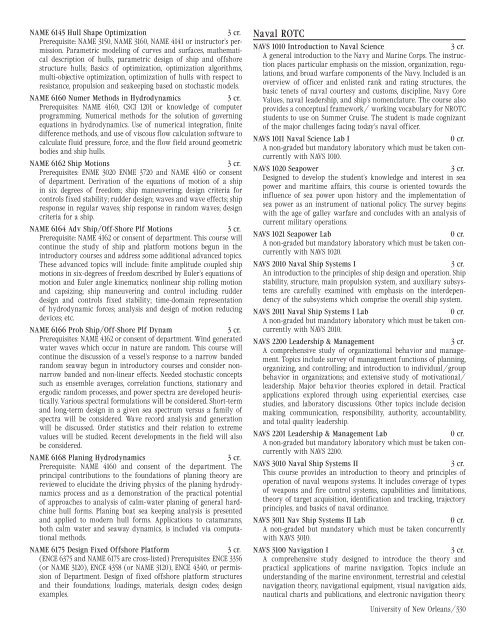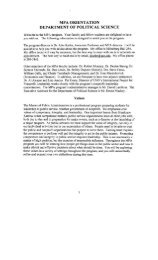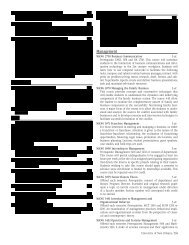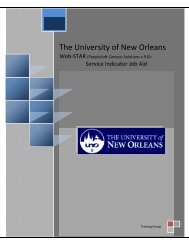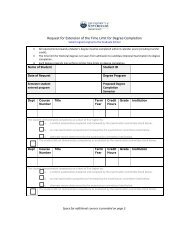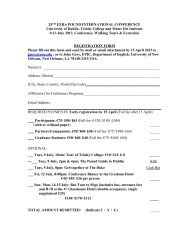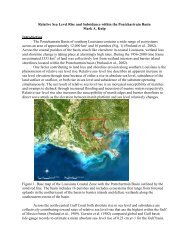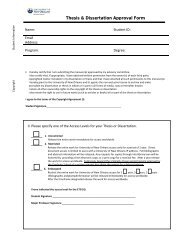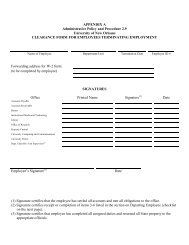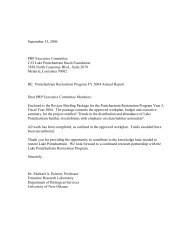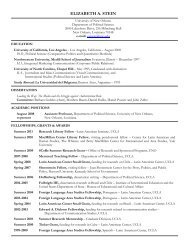Untitled - University of New Orleans
Untitled - University of New Orleans
Untitled - University of New Orleans
Create successful ePaper yourself
Turn your PDF publications into a flip-book with our unique Google optimized e-Paper software.
NAME 6145 Hull Shape Optimization<br />
3 cr.<br />
Prerequisite: NAME 3150, NAME 3160, NAME 4141 or instructor’s permission.<br />
Parametric modeling <strong>of</strong> curves and surfaces, mathematical<br />
description <strong>of</strong> hulls, parametric design <strong>of</strong> ship and <strong>of</strong>fshore<br />
structure hulls; Basics <strong>of</strong> optimization, optimization algorithms,<br />
multi-objective optimization, optimization <strong>of</strong> hulls with respect to<br />
resistance, propulsion and seakeeping based on stochastic models.<br />
NAME 6160 Numer Methods in Hydrodynamics<br />
3 cr.<br />
Prerequisites: NAME 4160, CSCI 1201 or knowledge <strong>of</strong> computer<br />
programming. Numerical methods for the solution <strong>of</strong> governing<br />
equations in hydrodynamics. Use <strong>of</strong> numerical integration, finite<br />
difference methods, and use <strong>of</strong> viscous flow calculation s<strong>of</strong>tware to<br />
calculate fluid pressure, force, and the flow field around geometric<br />
bodies and ship hulls.<br />
NAME 6162 Ship Motions<br />
3 cr.<br />
Prerequisites: ENME 3020 ENME 3720 and NAME 4160 or consent<br />
<strong>of</strong> department. Derivation <strong>of</strong> the equations <strong>of</strong> motion <strong>of</strong> a ship<br />
in six degrees <strong>of</strong> freedom; ship maneuvering; design criteria for<br />
controls fixed stability; rudder design; waves and wave effects; ship<br />
response in regular waves; ship response in random waves; design<br />
criteria for a ship.<br />
NAME 6164 Adv Ship/Off-Shore Plf Motions<br />
3 cr.<br />
Prerequisite: NAME 4162 or consent <strong>of</strong> department. This course will<br />
continue the study <strong>of</strong> ship and platform motions begun in the<br />
introductory courses and address some additional advanced topics.<br />
These advanced topics will include: finite amplitude coupled ship<br />
motions in six-degrees <strong>of</strong> freedom described by Euler’s equations <strong>of</strong><br />
motion and Euler angle kinematics; nonlinear ship rolling motion<br />
and capsizing; ship maneuvering and control including rudder<br />
design and controls fixed stability; time-domain representation<br />
<strong>of</strong> hydrodynamic forces; analysis and design <strong>of</strong> motion reducing<br />
devices; etc.<br />
NAME 6166 Prob Ship/Off-Shore Plf Dynam<br />
3 cr.<br />
Prerequisites: NAME 4162 or consent <strong>of</strong> department. Wind generated<br />
water waves which occur in nature are random. This course will<br />
continue the discussion <strong>of</strong> a vessel’s response to a narrow banded<br />
random seaway begun in introductory courses and consider nonnarrow<br />
banded and non-linear effects. Needed stochastic concepts<br />
such as ensemble averages, correlation functions, stationary and<br />
ergodic random processes, and power spectra are developed heuristically.<br />
Various spectral formulations will be considered. Short-term<br />
and long-term design in a given sea spectrum versus a family <strong>of</strong><br />
spectra will be considered. Wave record analysis and generation<br />
will be discussed. Order statistics and their relation to extreme<br />
values will be studied. Recent developments in the field will also<br />
be considered.<br />
NAME 6168 Planing Hydrodynamics<br />
3 cr.<br />
Prerequisite: NAME 4160 and consent <strong>of</strong> the department. The<br />
principal contributions to the foundations <strong>of</strong> planing theory are<br />
reviewed to elucidate the driving physics <strong>of</strong> the planing hydrodynamics<br />
process and as a demonstration <strong>of</strong> the practical potential<br />
<strong>of</strong> approaches to analysis <strong>of</strong> calm-water planing <strong>of</strong> general hardchine<br />
hull forms. Planing boat sea keeping analysis is presented<br />
and applied to modern hull forms. Applications to catamarans,<br />
both calm water and seaway dynamics, is included via computational<br />
methods.<br />
NAME 6175 Design Fixed Offshore Platform<br />
3 cr.<br />
(ENCE 6375 and NAME 6175 are cross-listed) Prerequisites: ENCE 3356<br />
(or NAME 3120), ENCE 4358 (or NAME 3120), ENCE 4340, or permission<br />
<strong>of</strong> Department. Design <strong>of</strong> fixed <strong>of</strong>fshore platform structures<br />
and their foundations; loadings, materials, design codes; design<br />
examples.<br />
Naval ROTC<br />
NAVS 1010 Introduction to Naval Science<br />
3 cr.<br />
A general introduction to the Navy and Marine Corps. The instruction<br />
places particular emphasis on the mission, organization, regulations,<br />
and broad warfare components <strong>of</strong> the Navy. Included is an<br />
overview <strong>of</strong> <strong>of</strong>ficer and enlisted rank and rating structures, the<br />
basic tenets <strong>of</strong> naval courtesy and customs, discipline, Navy Core<br />
Values, naval leadership, and ship’s nomenclature. The course also<br />
provides a conceptual framework/ working vocabulary for NROTC<br />
students to use on Summer Cruise. The student is made cognizant<br />
<strong>of</strong> the major challenges facing today’s naval <strong>of</strong>ficer.<br />
NAVS 1011 Naval Science Lab I<br />
0 cr.<br />
A non-graded but mandatory laboratory which must be taken concurrently<br />
with NAVS 1010.<br />
NAVS 1020 Seapower<br />
3 cr.<br />
Designed to develop the student’s knowledge and interest in sea<br />
power and maritime affairs, this course is oriented towards the<br />
influence <strong>of</strong> sea power upon history and the implementation <strong>of</strong><br />
sea power as an instrument <strong>of</strong> national policy. The survey begins<br />
with the age <strong>of</strong> galley warfare and concludes with an analysis <strong>of</strong><br />
current military operations.<br />
NAVS 1021 Seapower Lab<br />
0 cr.<br />
A non-graded but mandatory laboratory which must be taken concurrently<br />
with NAVS 1020.<br />
NAVS 2010 Naval Ship Systems I<br />
3 cr.<br />
An introduction to the principles <strong>of</strong> ship design and operation. Ship<br />
stability, structure, main propulsion system, and auxiliary subsystems<br />
are carefully examined with emphasis on the interdependency<br />
<strong>of</strong> the subsystems which comprise the overall ship system.<br />
NAVS 2011 Naval Ship Systems I Lab<br />
0 cr.<br />
A non-graded but mandatory laboratory which must be taken concurrently<br />
with NAVS 2010.<br />
NAVS 2200 Leadership & Management<br />
3 cr.<br />
A comprehensive study <strong>of</strong> organizational behavior and management.<br />
Topics include survey <strong>of</strong> management functions <strong>of</strong> planning,<br />
organizing, and controlling; and introduction to individual/group<br />
behavior in organizations; and extensive study <strong>of</strong> motivational/<br />
leadership. Major behavior theories explored in detail. Practical<br />
applications explored through using experiential exercises, case<br />
studies, and laboratory discussions. Other topics include decision<br />
making communication, responsibility, authority, accountability,<br />
and total quality leadership.<br />
NAVS 2201 Leadership & Management Lab<br />
0 cr.<br />
A non-graded but mandatory laboratory which must be taken concurrently<br />
with NAVS 2200.<br />
NAVS 3010 Naval Ship Systems II<br />
3 cr.<br />
This course provides an introduction to theory and principles <strong>of</strong><br />
operation <strong>of</strong> naval weapons systems. It includes coverage <strong>of</strong> types<br />
<strong>of</strong> weapons and fire control systems, capabilities and limitations,<br />
theory <strong>of</strong> target acquisition, identification and tracking, trajectory<br />
principles, and basics <strong>of</strong> naval ordinance.<br />
NAVS 3011 Nav Ship Systems II Lab<br />
0 cr.<br />
A non-graded but mandatory which must be taken concurrently<br />
with NAVS 3010.<br />
NAVS 3100 Navigation I<br />
3 cr.<br />
A comprehensive study designed to introduce the theory and<br />
practical applications <strong>of</strong> marine navigation. Topics include an<br />
understanding <strong>of</strong> the marine environment, terrestrial and celestial<br />
navigation theory, navigational equipment, visual navigation aids,<br />
nautical charts and publications, and electronic navigation theory.<br />
<strong>University</strong> <strong>of</strong> <strong>New</strong> <strong>Orleans</strong>/330


